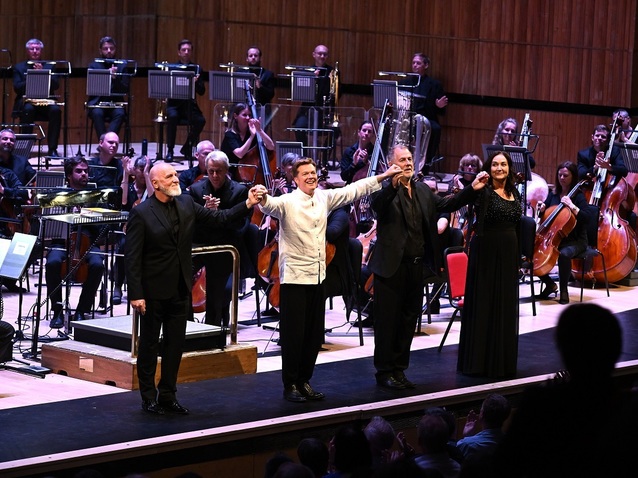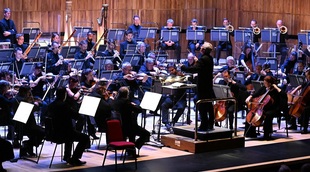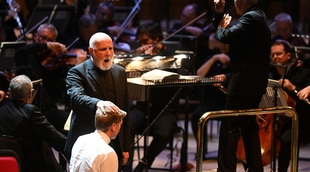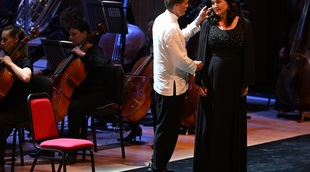 © (c) Mark Allan
© (c) Mark Allan
Premiering in 1882 at the Bayreuth Festspielhaus, Parsifal is Richard Wagner’s final opera and widely regarded as one of his greatest achievements. It is loosely based on Wolfram von Eschenbach’s epic poem Parzival, written in the first quarter of the thirteenth century, which recounts the story of the Arthurian knight Parzival and his quest for the Holy Grail. Set in Monsalvat, it sees the title character attempt to retrieve the Holy Spear that pierced Christ’s side from the evil magician Klingsor, although initially he does not understand his mission. It was lost when King Amfortas attempted to use it to defeat Klingsor, but ended up being seduced by a temptress and incurring a terrible wound that will not heal. With the Spear in the hands of such a troubling enemy, the Knights of the Grail, who protect the Holy Grail that was used at the Last Supper and caught Christ’s blood on the Cross, are determined to retrieve it. This, however, is a risky task as anyone attempting the feat could fall like Amfortas, meaning that the person who succeeds will have to be special in some way. For this reason, the King places his hopes on a holy vision in which he was told ‘Enlightened through compassion, the innocent fool; wait for him, the appointed one’.
When the youth Parsifal, which means ‘pure fool’ though the character does not know he bears that name, shoots a swan and is hauled up before the Knights, the veteran Knight Gurnemanz sees a naivety in him that makes him think he may be the one they await. When, however, he seems to show no reaction to the wondrous Grail ceremony, in which it is revealed and gives the Knights their life force, Gurnemanz concludes he was mistaken and dismisses him simply as a fool. Parsifal, however, did feel something only he did not understand what it meant. It is enough, however, to inspire him to go on what at that point seems to be nothing more than an exciting adventure.
Venturing to Klingsor’s garden in the desert, Parsifal finds he must overcome many obstacles presented by the magician including enchanted Knights, seductive Flowermaidens and the woman Kundry, who it transpires was the seductress who caused Amfortas to fall. He succeeds in withstanding her advances, however, when he suddenly feels Amfortas’s wound for himself and learns compassion. This enables him to understand the Saviour’s voice, which he now realises told him in the Hall of the Grail ‘Rescue Me, redeem Me from hands defiled by sin!’, and to take the Spear when Klingsor hurls it at him. Returning it to Monsalvat is no easy task in its own right, and by the time he does so Amfortas’s father Titurel is dead, but Parsifal is crowned King of the Grail and succeeds in healing Amfortas and releasing Kundry from her past sins by baptising her.
Opera North has been performing Parsifal across the whole of June. Director Sam Brown first presented it with sets and costumes in Leeds Grand Theatre, and the company has since taken a semi-staged version to a variety of venues across England. On its final outing at the Royal Festival Hall in London, several performances stood out as genuinely special, and none more so than that of the Orchestra of Opera North itself, under the baton of Richard Farnes. There was a lightness of touch that handed the music an ethereal quality, yet everything was so well balanced, and all the lines delineated so perfectly, that the output felt as masterly as it did tender. This said, certain moments such as those in the Temple of the Holy Grail that feature the Knights, Voices, Boys and Youths (all performed here by the Chorus of Opera North), felt as overwhelming as they ever do, making the scene feel just as much like a spiritual experience for the audience as it did for the characters in the drama.
Brindley Sherratt was a brilliant Gurnemanz. It was not simply the strength of his bass that told, but also the way in which he brought such lyricism to so many lines, including those whose primary purpose might be seen as feeding the audience information. There was a sense in which he was plumbing the very depths of his voice, only in a way that seemed totally effortless so that his sound was wondrously tender as he described the beautiful swan who Parsifal had, in his ignorance, shot. In the title role, tenor Toby Spence gave a highly thoughtful performance, with his initial confidence at being able to shoot anything that flies seeming to be shattered in an instant by Gurnemanz’s reproach. On entering the Hall of the Grail his face revealed a brilliant combination of wonder and bemusement, with his sense of fascination at all that he saw being sustained well throughout the scene. However, his expression retained the right amount of ambivalence, so that after the ceremony it could be clear to us that something had happened to him and equally obvious to Gurnemanz that all he had seen had meant nothing.
Katarina Karnéus was a suitably enigmatic and alluring Kundry who really brought her sumptuous mezzo-soprano to the fore at exactly the right moments. Robert Hayward delivered an extremely full and impassioned sound as Amfortas, and Stephen Richardson was excellent in the small role of Titurel. Derek Welton was an outstanding Klingsor, who seemed to embody the character in every way, and whose firm bass-baritone was as wonderful on the ear as it was undoubtedly assertive. It was the type of performance that left the audience lamenting the fact that the part is not bigger so it could hear more of the singer.
Some aspects of the semi-staging worked very well. For the first half of Act I the various Knights and Squires sat in a row in front of the orchestra, with Gurnemanz towards the centre, and rose when they sang. In this way, they highlighted their various characters so that some of them seemed quite self-righteous while Gurmenanz appeared wiser and more compassionate. When the Third Squire confronted Kundry, asking why she lay there like a wild beast, it looked as if the others were egging him on as they knew the question could incur Gurnemanz’s wrath. Similarly, when he asked Gurmemanz if he knew Klingsor, Sherratt really looked as if he was (initially) dodging answering the question lest any suggestion that he did so was misconstrued.
Elsewhere, not all of the decisions were as successful. It is a hard task to decide what action to ‘cut’ when moving from a staged to a semi-staged performance as it is not enough simply to retain anything that feasibly can be, because concert stagings have to work to a different overall tone. Nevertheless, even allowing for that, there were some key moments that needed to be conveyed more visually in order to aid the drama, and help the audience know what was going on. We did not need to see Parsifal literally grabbing Kundry by the throat in Act I, but there needed to be more of a sense of him advancing towards her and Gurnemanz stopping him in order for the Knight’s reproach that followed to make sense. In Act II, the Flowermaidens were very well sung (particularly by Samantha Clarke and Elin Pritchard) but it was far from obvious that Parsifal was on the verge of fleeing from them when Kundry called his name.
Kundry’s attempted seduction of Parsifal also suffered a little because, although it is quite a multi-textured affair, there still needs to be a sense of it being unrelenting as Kundry pushes forward, Parsifal knocks her back and she keeps trying again. The required momentum is harder to build up when so often the person not singing sits down, albeit while remaining in character, to allow the other to take centre-stage. The chosen approach made sense in terms of giving us more opportunity to focus on the thoughts, feelings and perspectives of the individual characters, which is what concert stagings can be so good at doing, but it made it feel far less of a battle of wills between the pair, even though the strength of the performances meant this was still a powerful scene. It is also questionable whether the ending did not miss something for not seeing Kundry die, since she does not actually sing in the final scene and so here did not appear at all. Nevertheless, there were many moments that certainly hit the mark so that the kisses between Parsifal and Kundry in Acts II and III seemed so different in nature that we felt with every fibre of our being the transformations that both characters had undergone. It was moments such as these, combined with truly outstanding musical credentials, that made Opera North’s Parsifal, the first to be seen in London for nine years, such a compelling affair. The performance in Leeds can be heard on BBC Radio 3 at 5.00pm on Saturday, 2 July, and subsequently on BBC Sounds.
By Sam Smith
Parsifal | 26 June 2022 | Royal Festival Hall, Southbank Centre, London
Image credit: Mark Allan
the 28 of June, 2022 | Print



Comments